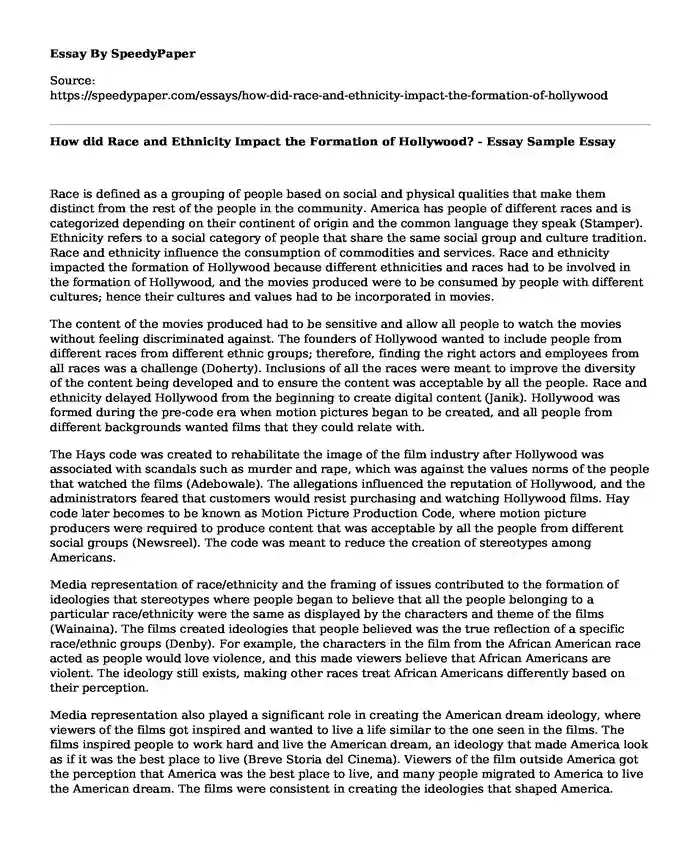
| Type of paper: | Essay |
| Categories: | Race Entertainment Movie Society |
| Pages: | 3 |
| Wordcount: | 809 words |
Race is defined as a grouping of people based on social and physical qualities that make them distinct from the rest of the people in the community. America has people of different races and is categorized depending on their continent of origin and the common language they speak (Stamper). Ethnicity refers to a social category of people that share the same social group and culture tradition. Race and ethnicity influence the consumption of commodities and services. Race and ethnicity impacted the formation of Hollywood because different ethnicities and races had to be involved in the formation of Hollywood, and the movies produced were to be consumed by people with different cultures; hence their cultures and values had to be incorporated in movies.
The content of the movies produced had to be sensitive and allow all people to watch the movies without feeling discriminated against. The founders of Hollywood wanted to include people from different races from different ethnic groups; therefore, finding the right actors and employees from all races was a challenge (Doherty). Inclusions of all the races were meant to improve the diversity of the content being developed and to ensure the content was acceptable by all the people. Race and ethnicity delayed Hollywood from the beginning to create digital content (Janik). Hollywood was formed during the pre-code era when motion pictures began to be created, and all people from different backgrounds wanted films that they could relate with.
The Hays code was created to rehabilitate the image of the film industry after Hollywood was associated with scandals such as murder and rape, which was against the values norms of the people that watched the films (Adebowale). The allegations influenced the reputation of Hollywood, and the administrators feared that customers would resist purchasing and watching Hollywood films. Hay code later becomes to be known as Motion Picture Production Code, where motion picture producers were required to produce content that was acceptable by all the people from different social groups (Newsreel). The code was meant to reduce the creation of stereotypes among Americans.
Media representation of race/ethnicity and the framing of issues contributed to the formation of ideologies that stereotypes where people began to believe that all the people belonging to a particular race/ethnicity were the same as displayed by the characters and theme of the films (Wainaina). The films created ideologies that people believed was the true reflection of a specific race/ethnic groups (Denby). For example, the characters in the film from the African American race acted as people would love violence, and this made viewers believe that African Americans are violent. The ideology still exists, making other races treat African Americans differently based on their perception.
Media representation also played a significant role in creating the American dream ideology, where viewers of the films got inspired and wanted to live a life similar to the one seen in the films. The films inspired people to work hard and live the American dream, an ideology that made America look as if it was the best place to live (Breve Storia del Cinema). Viewers of the film outside America got the perception that America was the best place to live, and many people migrated to America to live the American dream. The films were consistent in creating the ideologies that shaped America.
It is possible for today's media landscape to counter the narratives that were created and led to the formation of persistence dominant ideologies about race in America. The media today is accessed by more people; hence it is possible to change people's ideologies by consistently showing other narratives than the ones created (Williams). For example, consistent media coverage of crimes committed by people with different races can counter the ideology that only African American people are violent.
Works Cited
Adebowale, Temi. "How The Hays Code Censored Hollywood." Men's Health, 2020, https://www.menshealth.com/entertainment/a32290089/hollywood-hays-code/. Accessed 27 Sept 2020.
Breve Storia del Cinema. D. W. Griffith: The Birth of a Nation (1915). 2017, https://www.youtube.com/watch?v=N_yU8rRQKoA. Accessed 27 Sept 2020.
Denby, David. "Sex and Sexier the Hays Code Wasn’T All Bad.” The New Yorker, 2016, https://www.newyorker.com/magazine/2016/05/02/what-the-hays-code-did-for-women. Accessed 27 Sept 2020.
Doherty, Thomas. "What Is Pre-Code Hollywood?". Pre-Code.Com, 2020, https://pre-code.com/what-is-pre-code-hollywood/. Accessed 27 Sept 2020.
Janik, Rachel. "100 Years Later, What's The Legacy Of 'Birth Of A Nation'?". Npr.Org, 2015, https://www.npr.org/sections/codeswitch/2015/02/08/383279630/100-years-later-whats-the-legacy-of-birth-of-a-nation. Accessed 27 Sept 2020.
Newsreel, California. Ethnic Notions. 2018. https://vimeo.com/ondemand/ethnicnotions
Stamper, Kory. "Why We Confuse "Race" And "Ethnicity": A Lexicographer’S Perspective | Conscious Style Guide." Conscious Style Guide, 2019, https://consciousstyleguide.com/why-we-confuse-race-ethnicity-lexicographers-perspective/. Accessed 27 Sept 2020.
Wainaina, Binyavanga. "How to Write About Africa." Granta, 2019, https://granta.com/how-to-write-about-africa/. Accessed 27 Sept 2020.
Williams, Leah. "How Hollywood Whitewashed The Old West." The Atlantic, 2016, https://www.theatlantic.com/entertainment/archive/2016/10/how-the-west-was-lost/502850/. Accessed 27 Sept 2020.
Cite this page
How did Race and Ethnicity Impact the Formation of Hollywood? - Essay Sample. (2023, Dec 28). Retrieved from https://speedypaper.com/essays/how-did-race-and-ethnicity-impact-the-formation-of-hollywood
Request Removal
If you are the original author of this essay and no longer wish to have it published on the SpeedyPaper website, please click below to request its removal:
- Essay Sample on Charity in Islam
- Background Identity - Personal Essay Example
- Free Essay on Social Media Strategy for FnH Restaurant
- Essay Sample on the Media Lifecycle and Media Effect on Society
- Art Essay Sample Describing the Fervor Photo by Shirin Neshat
- Overcoming Challenges Faced by Transgender Individuals and Community - Essay Sample
- Paper Example on Combating Cardiovascular Changes in Aging: A Proposal for Prevention and Management
Popular categories




